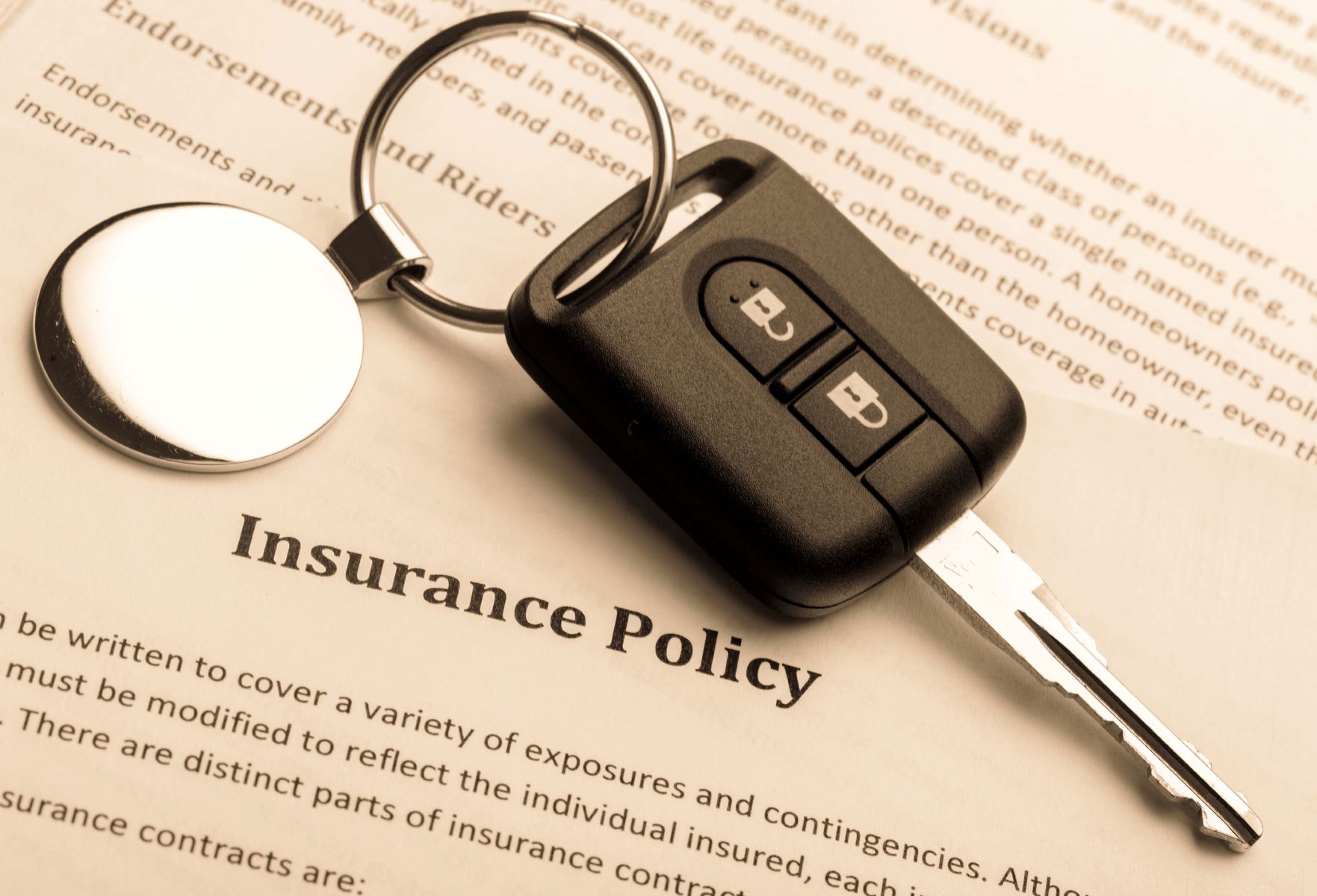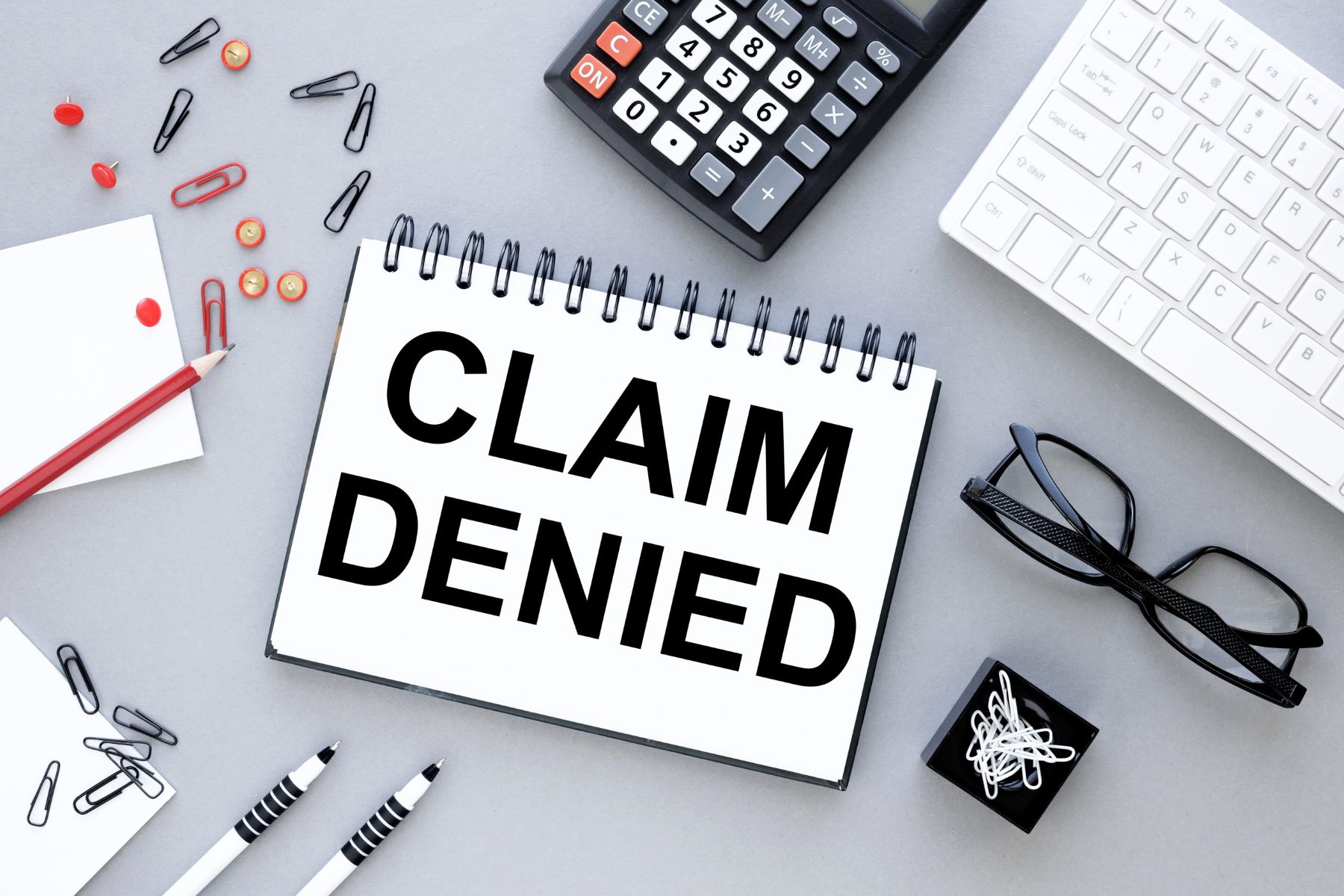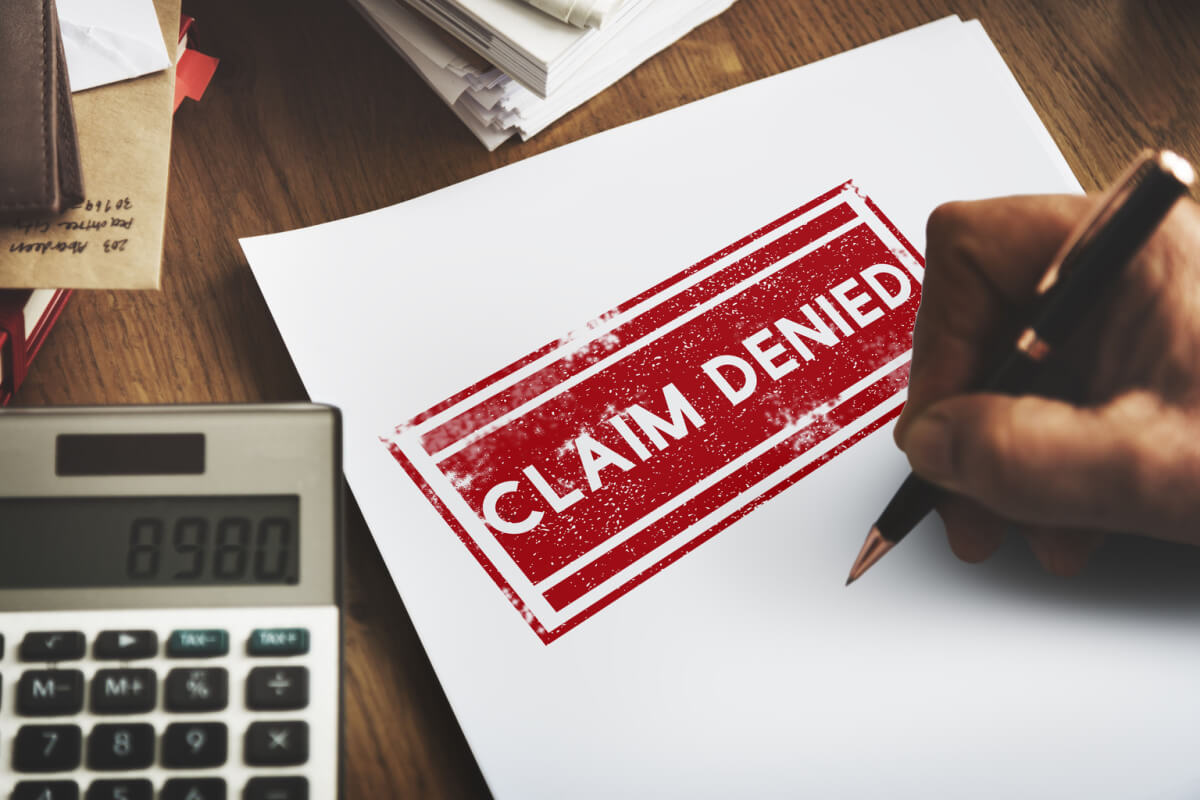

Finance
What Happens If Car Insurance Denies Claim
Published: November 13, 2023
Discover what to do if your car insurance denies your claim. Understanding the financial implications is crucial to protect yourself and your vehicle.
(Many of the links in this article redirect to a specific reviewed product. Your purchase of these products through affiliate links helps to generate commission for LiveWell, at no extra cost. Learn more)
Table of Contents
Introduction
Car insurance is a vital protection for drivers, providing coverage and financial support in the event of an accident or damage to a vehicle. However, there may be instances where car insurance claims are denied, leaving policyholders in a difficult situation. Understanding the reasons behind these denials can help drivers navigate the claims process more effectively and take appropriate steps to appeal or seek further assistance.
When an insurance claim is denied, it can be frustrating and leave individuals wondering what to do next. From insufficient coverage to policy exclusions, there are several factors that can contribute to a car insurance claim denial. It’s important to be familiar with these potential issues in order to be better prepared and equipped to handle such situations.
In this article, we will explore some of the common reasons why car insurance claims may be denied and discuss possible solutions or actions that can be taken to address these denials. It is important to note that the specific terms and conditions of each insurance policy may vary, so it is crucial to consult the policy itself and seek professional advice if needed.
Reasons for Car Insurance Claim Denial
While it is unsettling to have a car insurance claim denied, it is essential to understand the reasons behind these denials. By familiarizing yourself with these reasons, you can take appropriate steps to prevent claim denials or be prepared to address them effectively if they occur.
- Insufficient Coverage: One of the most common reasons for car insurance claim denial is insufficient coverage. This typically occurs when the policyholder’s insurance policy does not provide coverage for the specific type of claim being made. For example, if the claim involves damage caused by a natural disaster, but the policy does not include coverage for natural disasters, the claim may be denied.
- Policy Exclusions: Insurance policies often contain exclusions, which are specific situations or circumstances that are not covered. It is crucial to thoroughly review your policy to understand these exclusions. For instance, if the claim arises from an accident caused by a driver under the influence of alcohol or drugs, and your policy explicitly excludes coverage for such incidents, the claim is likely to be denied.
- Failure to Report or Timely File a Claim: In some cases, insurance companies may deny a claim if it is not reported promptly or not filed within the required timeframe. It is essential to notify your insurance company as soon as possible after an incident and follow their specific procedures for filing a claim. Failure to do so could result in claim denial.
- Fraudulent or Misleading Information: Providing false or misleading information when filing a claim is a serious offense that can lead to claim denial. Insurance companies conduct thorough investigations, and if they discover any fraudulent or misleading information, your claim will likely be denied. It is vital to be completely honest and accurate when providing information related to your claim.
- Disputes over Liability: In some situations, there may be disputes over who is at fault in an accident. If the insurance company determines that the policyholder is at fault or partially at fault based on the evidence available, they may deny the claim. This is why it is essential to gather ample documentation and evidence to support your claim and ensure that liability is properly assessed.
These are just a few examples of the reasons why car insurance claims get denied. It’s important to carefully review your insurance policy, promptly report incidents, provide accurate information, and gather sufficient evidence to support your claim. By doing so, you can minimize the chances of a claim denial and increase your chances of a successful resolution.
Insufficient Coverage
Having sufficient coverage is crucial when it comes to car insurance claims. If your policy does not provide coverage for the specific type of claim you are making, your claim may be denied due to insufficient coverage. It is important to understand the different types of coverage offered by your insurance policy and ensure that you have adequate protection for potential risks and incidents.
When purchasing car insurance, it is essential to carefully review the policy and understand the coverage limits and exclusions. Common types of coverage include liability coverage, which pays for damages caused to others in an accident where you are at fault, and comprehensive and collision coverage, which protect against damage to your own vehicle. Additionally, there may be optional coverages such as uninsured/underinsured motorist coverage and medical payments coverage.
If your claim is denied due to insufficient coverage, it may be a result of not having the appropriate policy in place or not opting for the necessary add-ons. For example, if you are involved in an accident caused by an uninsured motorist, but you did not have uninsured motorist coverage, your claim for damages may be denied. Similarly, if your policy does not include coverage for rental car expenses, your claim for reimbursement for a rental car during vehicle repairs may be denied.
To avoid claim denial due to insufficient coverage, it is important to regularly review and update your insurance policy to ensure it meets your needs. Consider factors such as your driving habits, the value of your vehicle, and any additional risks you may face. Consulting with an insurance agent can help you assess your coverage needs and make any necessary adjustments.
Remember that each insurance policy is unique, and specific coverage details may vary. Take the time to thoroughly read and understand your policy, paying close attention to the coverage limits, deductibles, and exclusions. If you have any questions or concerns, reach out to your insurance provider for clarification.
If you discover that you have insufficient coverage after a claim denial, it may be worth exploring options to supplement your existing policy. This could involve adding different types of coverage or increasing your coverage limits. However, it is important to note that any changes to your policy may result in adjustments to your premiums, so it is crucial to consider the costs and benefits before making any modifications.
By ensuring that you have sufficient coverage in place, you can lower the risk of claim denial due to insufficient coverage and have peace of mind knowing that your insurance will provide the necessary financial protection in the event of an accident or damage to your vehicle.
Policy Exclusions
When it comes to car insurance claim denials, policy exclusions play a significant role. Policy exclusions are specific situations or circumstances that are not covered by your insurance policy. It is important to thoroughly review your policy to understand these exclusions, as they can lead to claim denial if your situation falls within their scope.
Insurance policies commonly contain a list of exclusions that outline what the policy does not cover. These exclusions can vary depending on the insurance company and the type of policy you have. Examples of common exclusions in car insurance policies include intentional acts, racing or illegal activities, using a personal vehicle for commercial purposes, and normal wear and tear. Other exclusions may involve using the vehicle outside of specified geographical boundaries or lending the vehicle to someone who is not listed on the policy.
If your claim falls under one of these excluded scenarios, it is likely that your insurance company will deny the claim. It is important to carefully review your policy and have a clear understanding of the exclusions to avoid any surprises when you file a claim.
It is worth noting that some exclusions can be added or removed from your policy through endorsements or additional coverage options. For example, if your policy excludes coverage for rental cars, you may be able to add a rental car reimbursement endorsement to your policy for an additional premium. It is essential to discuss your specific coverage needs with your insurance provider and explore available options to address any potential gaps.
Keep in mind that exclusions can vary between insurance companies and policies. What is excluded in one policy may be covered in another. It is crucial to compare insurance policies and carefully read through the terms and conditions to select the one that best suits your needs and provides coverage for the circumstances you want protection against.
Overall, understanding and being aware of the policy exclusions in your car insurance policy is essential. By familiarizing yourself with these exclusions and taking appropriate measures to address any gaps in coverage, you can minimize the chances of claim denial due to policy exclusions and ensure that you have the necessary coverage when you need it.
Failure to Report or Timely File a Claim
When it comes to car insurance claims, timing is crucial. Failure to report an incident or file a claim in a timely manner can result in claim denial. It is vital to understand the importance of prompt reporting and filing, as well as the potential consequences of failing to do so.
Once an accident or incident occurs, it is essential to notify your insurance company as soon as possible. Most insurance policies have specific timeframes within which claims must be reported. These timeframes can vary, but it is generally recommended to report a claim within 24 to 48 hours after the incident. Failing to report an incident promptly can give the insurance company reason to suspect fraud or question the severity of the damages, which may lead to claim denial.
In addition to timely reporting, it is equally important to file your claim within the designated timeframe outlined in your policy. Insurance policies typically have specific requirements for filing a claim, including the submission of necessary documents, such as accident reports, witness statements, and repair estimates. Failure to submit these documents within the specified timeframe can result in claim denial.
Notifying your insurance company and filing a claim promptly serves multiple purposes. First, it allows the insurance company to begin the claims process and allocate the necessary resources to handle your claim efficiently. Second, it ensures that all required documentation and evidence can be gathered and properly assessed. Lastly, it helps establish a clear timeline of events, minimizing the risk of disputed facts or conflicting statements.
If there are legitimate reasons for delayed reporting or filing, such as injury or medical emergencies, it is crucial to communicate these reasons to your insurance company as soon as possible. Insurance companies understand that there may be exceptional circumstances that cause delays, and they may provide flexibility in such cases. However, it is important to clearly communicate and provide documentation to support your claim for an exception to the usual reporting and filing requirements.
To avoid claim denial due to failure to report or timely file a claim, it is recommended to keep a record of all incidents, gather necessary information immediately, and promptly notify your insurance company. By taking immediate action, you can fulfill your obligations under the policy and increase the chances of a successful claim resolution.
Remember, each insurance policy may have unique reporting and filing requirements, so it is crucial to review your policy and familiarize yourself with the specific procedures. If you have any questions or concerns regarding the reporting or filing process, do not hesitate to reach out to your insurance provider for guidance.
Fraudulent or Misleading Information
Providing accurate and honest information is of utmost importance when filing a car insurance claim. Insurance companies conduct thorough investigations to verify the details and circumstances surrounding a claim. If they discover any fraudulent or misleading information provided by the policyholder, the claim is likely to be denied.
Fraudulent or misleading information can take various forms. It could involve intentionally providing false information about the incident, exaggerating the extent of damages, or misrepresenting the facts to receive a higher payout from the insurance company. Additionally, withholding relevant information that could affect the outcome of the claim is considered misleading and can result in claim denial.
Insurance companies employ various methods to detect fraud, such as comparing the details provided in the claim with the information from other sources, conducting interviews with parties involved, scrutinizing documentation, and analyzing patterns or inconsistencies. They may also collaborate with investigators or specialized fraud detection agencies to thoroughly investigate suspicious claims.
It is crucial to understand that providing fraudulent or misleading information not only puts your claim at risk but can also have legal consequences. Insurance fraud is a serious offense that can lead to criminal charges and severe fines or imprisonment.
To ensure a successful claim process and avoid claim denial due to fraudulent or misleading information, it is essential to be completely honest and accurate when providing information related to your claim. This includes providing truthful statements about the incident, accurately documenting the damages or injuries, and disclosing any relevant information requested by the insurance company.
If you have made an unintentional mistake or neglected to provide certain details, it is important to rectify the situation as soon as possible. Notify your insurance company immediately and provide the correct information or documentation required to support your claim. It is always better to correct any errors or omissions promptly than to risk claim denial and potential legal consequences.
If you suspect or witness fraudulent activity related to your insurance claim, it is your responsibility to report it to your insurance company or appropriate authorities. By doing so, you contribute to the prevention and detection of insurance fraud, protecting the integrity of the insurance industry.
Remember, truthfulness and transparency are essential when filing an insurance claim. By providing accurate information and cooperating fully with the insurance company’s investigation, you can increase the likelihood of a successful claim resolution and maintain your integrity throughout the process.
Disputes over Liability
In some car insurance claims, disputes can arise over who is at fault or the extent of liability in an accident. These disputes can significantly impact the outcome of a claim and potentially result in claim denial. It is crucial to understand how liability is determined and what steps to take in the event of a dispute.
Liability determination in car accidents is based on evidence, witness statements, police reports, and applicable laws. Insurance companies conduct their own investigations to assess the circumstances leading up to the accident and make a determination on fault. However, sometimes there can be disagreements between the insurance company, the policyholder, and other involved parties regarding who is responsible for the accident.
If the insurance company determines that the policyholder is at fault or partially at fault based on the evidence, they may deny liability for certain damages or deny the claim altogether. This is why gathering ample documentation and evidence to support your version of events is crucial.
If you find yourself in a dispute over liability, there are several steps you can take to resolve the situation:
- Review the evidence: Carefully review the evidence surrounding the accident, including photographs, witness statements, and police reports. Identify any discrepancies or inconsistencies that can help support your claim and challenge the insurance company’s determination of fault.
- Consult an attorney: If the dispute is complex or involves significant damages, it may be beneficial to consult with an attorney who specializes in car accident and insurance claims. They can provide guidance on how to navigate the dispute and protect your rights.
- Present additional evidence: If you have any additional evidence, such as expert opinions or video footage, that can support your claim and challenge the insurance company’s findings, make sure to present it in a clear and organized manner.
- Engage in negotiations: In some cases, engaging in negotiations with the insurance company or the other involved parties can help resolve the dispute. This can involve providing additional evidence, presenting arguments, or engaging in mediation or arbitration processes.
- File an appeal: If your claim gets denied due to a liability dispute, you may have the option to file an appeal with your insurance company. This requires submitting a formal written appeal explaining your side of the story and providing supporting evidence.
- Seek legal assistance: If the dispute remains unresolved, seeking legal assistance may be necessary. An attorney can guide you through the process of filing a lawsuit and representing your interests in court.
It is crucial to prepare yourself for the possibility of a liability dispute by gathering as much evidence as possible from the scene of the accident, obtaining witness statements, and preserving any relevant documentation. By taking these proactive steps, you can strengthen your position and increase your chances of a successful resolution to the dispute.
Remember, each case is unique, and the specific steps to handle a liability dispute may vary. It is important to consult with the insurance company, seek legal advice when necessary, and be persistent in pursuing a resolution that is fair and just.
Documentation and Evidence Requirements
When filing a car insurance claim, proper documentation and evidence play a critical role in supporting your case and increasing the likelihood of a successful claim resolution. Insurance companies rely on these materials to assess the nature and extent of damages, determine liability, and evaluate the validity of your claim. Therefore, it is crucial to understand the documentation and evidence requirements and ensure that you gather and provide all necessary information.
Here are some common documentation and evidence requirements for car insurance claims:
- Accident Report: In case of an accident, it is important to obtain a police report or accident report as soon as possible. This official document provides details of the accident, including date, time, location, parties involved, and any citations issued. It acts as a crucial piece of evidence when filing a claim.
- Photographs and Videos: Take clear and comprehensive photographs or videos of the accident scene, including damages to your vehicle, the other party’s vehicle, and any other relevant details. These visuals can help the insurance company assess the extent of damages and determine liability.
- Witness Statements: If there were any witnesses to the accident, try to obtain their contact information and ask them for a written or recorded statement regarding what they saw. Witness statements can add credibility to your claim and provide additional perspectives on the incident.
- Repair Estimates: Obtain written repair estimates from reputable repair shops or mechanics. These estimates help the insurance company evaluate the cost of repairs and validate the damages claimed.
- Medical Records: If you sustained injuries in the accident, gather all medical records, including doctor’s reports, diagnostic tests, and bills related to your treatment. These records provide evidence of your injuries and the medical expenses incurred, which are essential for claiming compensation.
- Proof of Ownership: Provide documentation that proves you are the rightful owner of the vehicle involved in the accident. This can include the vehicle’s title, registration documents, and any loan or lease agreements.
Additionally, it is important to keep a thorough record of all communication with your insurance company. This includes copies of emails, letters, or any other written correspondence, along with detailed notes of phone calls, including the date, time, and the name of the person you spoke to. These records can help substantiate your claim and serve as a reference throughout the claims process.
Insurance policies may have specific deadlines for submitting documentation and evidence, so it is important to familiarize yourself with these requirements and ensure timely submission. Failure to provide the necessary documentation within the specified timeframe may result in claim denial.
Remember, the more accurate and comprehensive your documentation and evidence, the stronger your claim will be. It is always better to provide more information than necessary than to risk insufficient evidence. If you have any questions or concerns regarding the documentation and evidence requirements, reach out to your insurance company for clarification or seek professional advice to ensure you meet all the necessary obligations.
Appealing a Denied Car Insurance Claim
Receiving a denial for your car insurance claim can be disheartening and frustrating. However, it is important to remember that a claim denial is not always the final decision. In many cases, you have the option to appeal the decision and provide additional information or evidence to support your claim. Here are some key steps to consider when appealing a denied car insurance claim:
1. Review the denial letter: Carefully read the denial letter from your insurance company. Understand the specific reasons provided for the claim denial and any supporting documentation or policy references provided. This will help you understand the basis for the denial and guide your appeal process.
2. Gather additional evidence: Assess the information and evidence you initially provided and identify any gaps or areas where additional documentation or evidence could strengthen your case. This could include obtaining further repair estimates, medical records, witness statements, or any other relevant documents to support your claim.
3. Contact your insurance company: Reach out to your insurance company to express your desire to appeal the denied claim. Ask for specific instructions on the appeal process and any additional information or documentation they may require. It is crucial to maintain open and clear communication throughout the appeals process.
4. Submit a formal appeal letter: Prepare a formal written appeal letter addressing the reasons for the denial and presenting your case. Clearly explain why you believe the denial was incorrect and provide any new evidence or documentation that supports your claim. Be concise, factual, and professional in your letter.
5. Follow the appeals process and timeline: Familiarize yourself with your insurance company’s appeals process and adhere to the specified timeline for submitting your appeal. Make sure to include all necessary documents and information as outlined in the appeal instructions provided by your insurer.
6. Consider getting legal assistance: Depending on the complexity of your case or if you encounter challenges during the appeals process, you may want to seek legal advice from an attorney who specializes in insurance claims. They can provide guidance on specific legal matters and assist you in presenting a strong case.
7. Keep records of all communication: Document all communication, including dates, times, persons involved, and the content of conversations or written correspondence. This record will help you keep track of the progress of your appeal and provide reference points if needed.
8. Follow up regularly: Stay proactive and regularly follow up with your insurance company to check the status of your appeal. Be persistent without being pushy, and politely request updates on the progress of your case.
9. Consider alternative dispute resolution: If the appeal process with your insurance company proves unsuccessful, you may explore alternative dispute resolution methods such as mediation or arbitration. These processes offer an unbiased third-party to help reach a resolution outside of the traditional court system.
10. Seek legal advice if necessary: If all attempts to resolve the claim denial fail, you may want to consult with an attorney to discuss the possibility of filing a lawsuit against your insurance company. They can guide you on the legal options available to you and represent your interests if litigation becomes necessary.
Remember, the appeals process can take time, and there is no guarantee of a successful outcome. However, by following these steps and presenting a strong case with compelling evidence, you increase your chances of reversing a denied car insurance claim and obtaining the coverage you deserve.
Seeking Legal Help
Dealing with a denied car insurance claim can be a complex and challenging situation. If you have exhausted all avenues and are unable to reach a satisfactory resolution with your insurance company, it may be time to seek legal help. Consulting with an attorney who specializes in insurance claims can provide valuable guidance and assistance throughout the process.
Here are some key reasons why seeking legal help may be beneficial when dealing with a denied car insurance claim:
Expert knowledge and experience: Insurance laws and policies can be intricate and confusing. Attorneys who specialize in insurance claims have in-depth knowledge and experience in navigating insurance disputes. They can provide you with valuable insights, help you understand your rights and obligations, and guide you through the legal process.
Case evaluation: An attorney can objectively evaluate the details of your case, including the denial letter, policy documents, and other relevant information, to determine the strength of your claim. They can identify potential legal arguments, highlight any violations by the insurance company, and advise you on the best course of action.
Legal strategy development: When it comes to appealing a denied claim or taking legal action against your insurance company, it is vital to have a well-defined legal strategy. An attorney can assist you in developing an effective strategy tailored to your specific circumstances. They can help gather additional evidence, prepare legal documents, and represent your interests throughout the process.
Negotiation and settlement discussion: Attorneys are skilled negotiators who can engage in discussions with the insurance company on your behalf. They can advocate for a fair and reasonable settlement and use their legal expertise to press the insurance company to reconsider its decision or offer a more favorable resolution.
Litigation representation: In cases where negotiation and settlement discussions do not yield satisfactory results, your attorney can represent you in court if you decide to file a lawsuit against the insurance company. They will handle all legal aspects of the case, including preparing legal arguments, presenting evidence, cross-examining witnesses, and advocating for your rights during the litigation process.
Minimize stress and maximize results: Dealing with a denied car insurance claim can be emotionally draining and time-consuming. By entrusting your case to an experienced attorney, you can alleviate some of the stress and focus on other important matters. Moreover, legal representation increases your chances of obtaining a favorable outcome and receiving the insurance coverage that you are entitled to.
It is important to consult with a reputable attorney who has a track record of handling insurance claims successfully. Seek recommendations from trusted sources, do your research, and schedule initial consultations to discuss your case and evaluate the attorney’s expertise and approach.
Remember, seeking legal help should be considered when other methods of resolving the denied claim have been exhausted or when the complexity of the situation demands legal intervention. An attorney can serve as a strong advocate on your side, protecting your rights and fighting for a fair resolution to your car insurance claim.
Conclusion
Dealing with a denied car insurance claim can be a frustrating and challenging experience. However, understanding the reasons for claim denials and knowing how to navigate the appeals process or seek legal help can significantly improve your chances of obtaining the coverage you deserve. By being proactive, prepared, and knowledgeable about the specifics of your insurance policy, you can better navigate the claims process and increase the likelihood of a successful resolution.
Insufficient coverage, policy exclusions, failure to report or timely file a claim, fraudulent or misleading information, disputes over liability, and documentation requirements are common factors that contribute to car insurance claim denials. By familiarizing yourself with these potential issues and addressing them effectively, you can minimize claim denials and potential setbacks.
Remember to review your insurance policy thoroughly, understand the coverage limitations and exclusions, and ensure that you have sufficient coverage to meet your needs. Promptly reporting and filing claims, providing accurate and truthful information, and gathering adequate documentation and evidence are essential steps to prevent claim denials.
If your claim is denied, consider appealing the decision by gathering additional evidence, following the appeals process and timeline, and seeking legal help if necessary. An attorney specializing in insurance claims can provide guidance, evaluate your case, develop a legal strategy, and represent your interests throughout the claims process or in court if litigation becomes necessary.
Ultimately, navigating a denied car insurance claim requires persistence, attention to detail, and sometimes expert advice. By being proactive, maintaining clear communication with your insurance company, and seeking the necessary assistance, you can increase your chances of a successful resolution and obtain the financial protection and compensation that you deserve.














